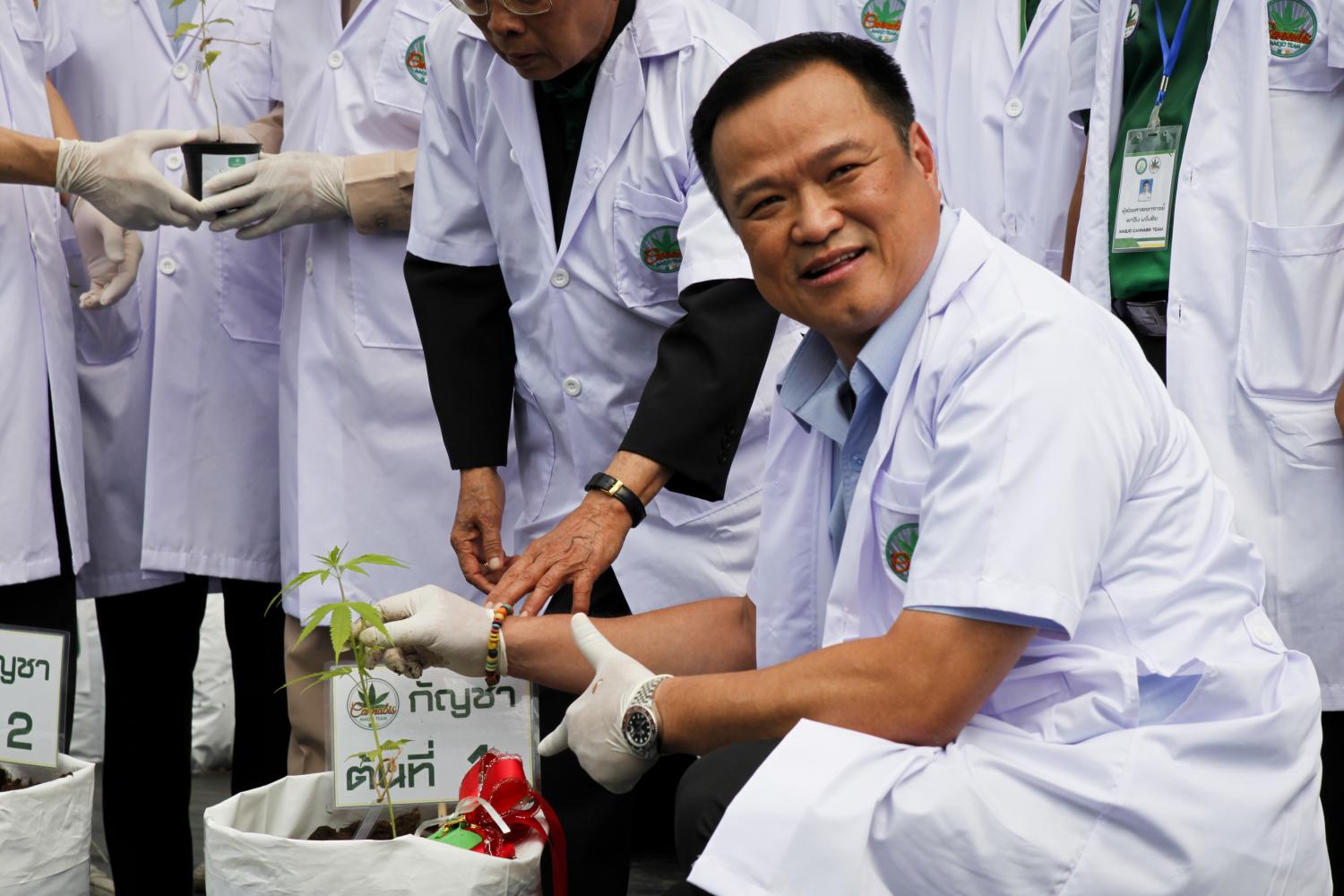
CHAING MAI: The country's largest lot of 12,000 cannabis sprouts has been planted in Maejo University's medical-grade greenhouse, thought to be the first-ever industrial-scale medical cannabis manufacturing facility in the Asean region.
They were planted with the aim of producing one million bottles containing five millilitres each of cannabis oil for patients in need by next February.
A special planting ceremony took place yesterday at the 907-rai organic farm in Chiang Mai's Maejo University.
Joining the event were senior officials from the Ministry of Public Health, the university's executive team, the provincial governor and local administrative organisations.
In the 3,040-square-metre greenhouse, where the crop is being grown using purely organic methods, Deputy Prime Minister and Public Health Minister Anutin Charnvirakul planted the first sprout.
The facility is being kept under high security because cannabis is technically still regarded as a narcotic.
A recent revision to the law, however, allows cannabis to be grown and prescribed for medical purposes. Cultivation of the crops can only be done legally by state-approved agencies.
"These are historic first steps on the path towards allowing people to grow six cannabis trees in their homes. The university will be a centre where ordinary people can learn how to plant and grow good quality cannabis. Cannabis is not an issue of politics, it is a product that can benefit people's health. In the near future, families will be able to plant it in their back gardens like any other herb," said Mr Anutin.
Maejo University, the Department of Medical Service and the Government Pharmaceutical Organisation (GPO) signed a memorandum of understanding in June concerning the development of cannabis plantations, including local strain development for medical use, for which 12,000 seeds were donated by the department.
Meanwhile, in September, the narcotic board granted a plantation licence to the university covering the cultivation of cannabis in its greenhouse.
It is expected to have produced 2.4 tonnes of dried cannabis flowers by February next year from those seeds.
The medical-grade crop will later be forwarded to the GPO's cannabis oil production unit where it will be pressed to produce five thousand litres.
This will be provided to doctors to prescribe to patients who qualify for treatment.
Arnat Tancho, director of Maejo Natural Farming Research and Development Centre, who is also the cannabis project's manager, said the facility has the capability to produce a medical-grade crop as the area has only ever been used for organic farming, without the use of any fertilisers containing heavy metals or other toxic elements.
He added the plantation also uses smart technology to control temperature, moisture levels and light for the best results.
He also said the university has developed a local strain from the north for medicinal use and named it "Issara 01", which means "independence", to inspire researchers to develop more domestic cannabis strains and not depend on foreign strains, adding that the university is going to develop its own "Maejo 01" strain which is expected to be launched shortly.
The university has laid out a roadmap for its plan to develop the six other local cannabis strains into prescribable medications, each with a different ratio of CBD and THC for different purposes of treatment.
The current Issara 01 crop will have an equal ratio of CBD and THC, which is the most needed for medical treatment right now.
"If the plantation licence is approved, we have plans to extend the cannabis-growing to outdoor areas too, which is likely to be suitable for the local strains that are found in many parts of the country," Mr Arnat said.
"We will also continue our research and development to find the perfect strains for particular medical treatments," he added.
The Thai Food and Drug Administration's decision to approve cannabis oil for prescription was met with cautious optimism by medical practitioners.
However, the GPO's first phase of cannabis oil production in June-July produced a crop with a higher ratio of THC than CBD, which has a higher potential for causing side effects in patients.
Regarding these cases, Mr Anutin said further clinical tests will be carried out on the various strains and ratios involved, but the drug is still safe to prescribe at present.
Meanwhile, the chief of the Department of Medical Service, Somsak Akasin, said initial results from the medicinal use of cannabis in Thailand, which began one month ago on Aug 20, show that patients with cancer have a better quality of life as the side-effects of their chemotherapy are mitigated by taking cannabis oil.
Half of the children with epilepsy who have taken the drug have responded well to the treatment, he said.

